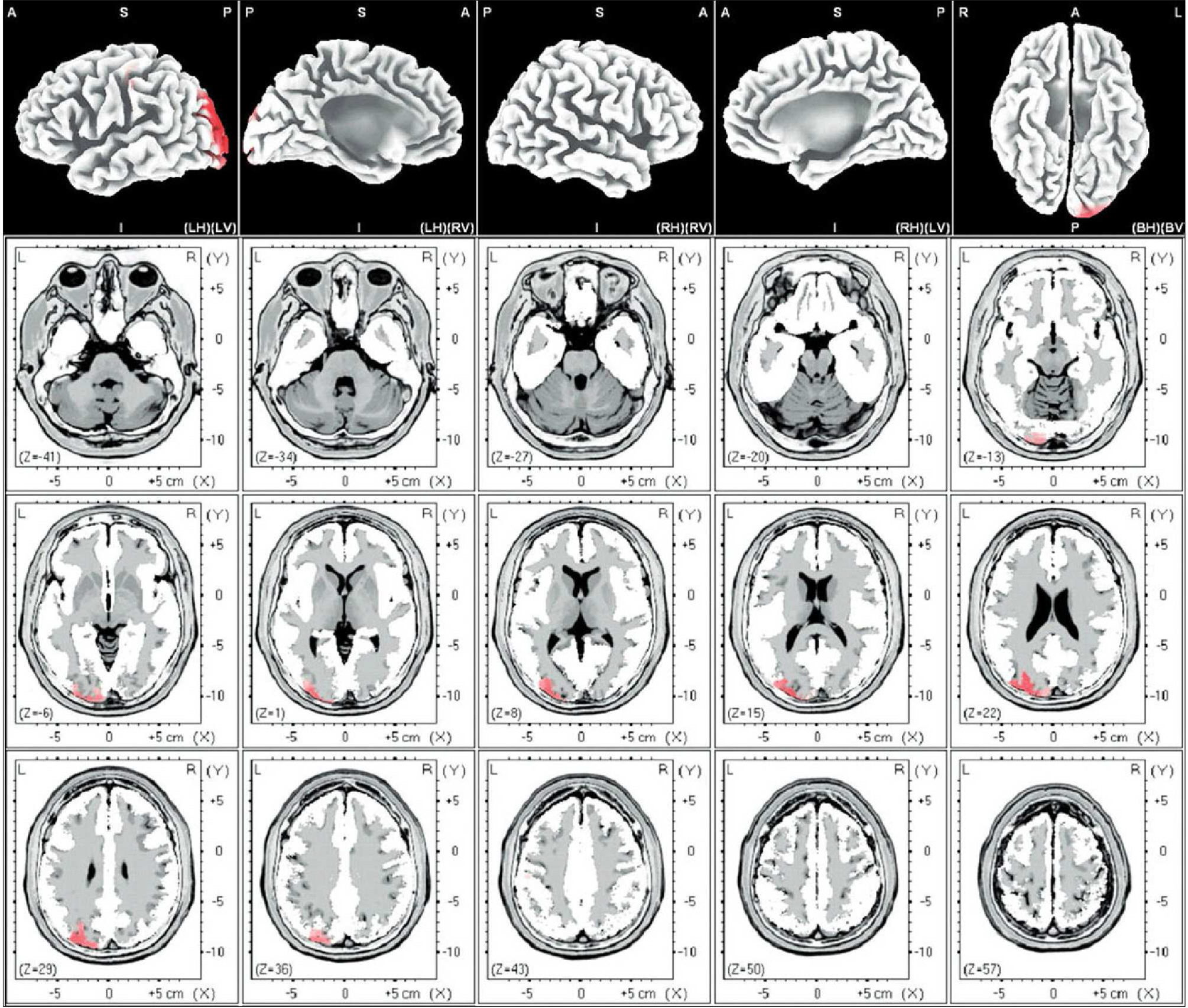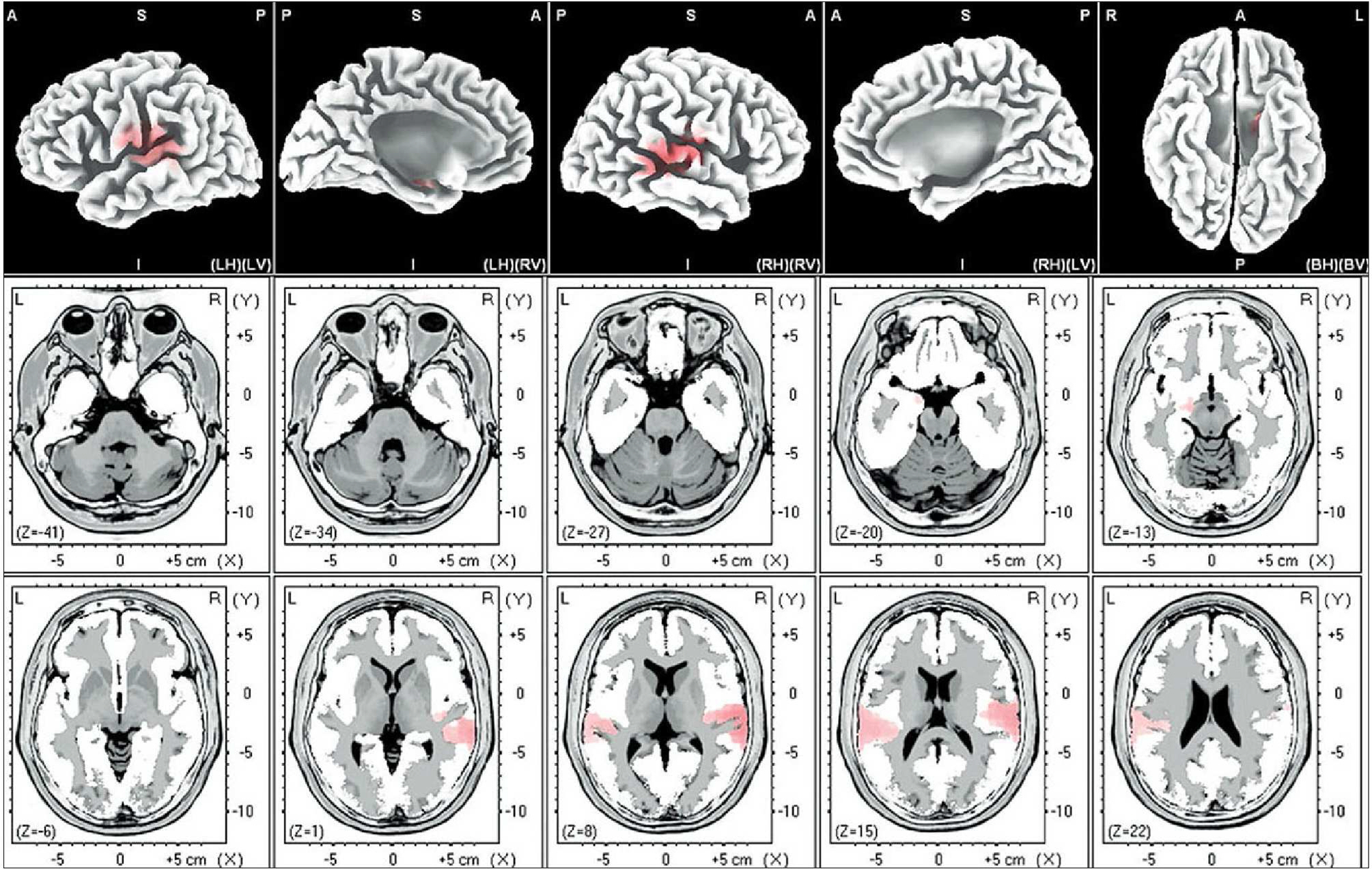Korean J Urol.
2007 Mar;48(3):333-343. 10.4111/kju.2007.48.3.333.
Location of Brain Electrical Source Activation by Visually Stimulated Sexual Arousal in Young Men and Women: a Cross Spectral Analysis using Low Resolution Brain Electromagnetic Tomography (LORETA)
- Affiliations
-
- 1Department of Urology, School of Medicine, Gyeongsang National University, Jinju, Korea. hyunjs@gshp. gsnu.ac.kr
- 2Department of Neurology, School of Medicine, Gyeongsang National University, Jinju, Korea.
- KMID: 1997134
- DOI: http://doi.org/10.4111/kju.2007.48.3.333
Abstract
- PURPOSE
To investigate the locations of the cerebral cortex activated by visually stimulated sexual arousal, and to discriminate the gender differences between the cortical activation patterns in response to sexual stimuli.
MATERIALS AND METHODS
Thirty-two male and the twenty-one female volunteers from right-handed medical students were enrolled in this study. The electroencephalography (EEGs) included the segments recorded during resting, watching a music-video, intermission and watching a pornographic video. The low-resolution brain electromagnetic tomography (LORETA) images of cross-spectral analysis were obtained from the segments using the LORETA-KEY software.
RESULTS
The beta 1, 2 and 3 activities of males showed the point of maximal current densities in both the uncus and parahippocampal gyrus of the left limbic lobe, the anterior cingulate of the right limbic lobe, the superior temporal gyrus of both temporal lobes, the precuneus of the right parietal lobe, the medial frontal gyrus and superior frontal gyrus of the right frontal lobe, the superior parietal lobule of the right parietal lobe, and the middle occipital gyrus of both occipital lobes. The delta, theta, alpha and beta 1 activities of females showed the point of maximal current densities in the postcentral gyrus and inferior parietal lobule of the left parietal lobe, the middle frontal gyrus of the left frontal lobe, the middle occipital gyrus of the left occipital lobe, the left cuneus, the superior temporal gyrus of both temporal lobes and the left parahippocampal gyrus.
CONCLUSIONS
There was a difference in the visually stimulated sexual arousal-associated with the cerebral neuroanatomical areas between men and women, as estimated using the LORETA software. These areas; therefore, were thought to play important roles in the sexual arousal of males and females in response to audiovisual sexual stimulation.
Keyword
MeSH Terms
Figure
Cited by 1 articles
-
Effect of Sertraline on Current-Source Distribution of the High Beta Frequency Band: Analysis of Electroencephalography under Audiovisual Erotic Stimuli in Healthy, Right-Handed Males
Seung Hyun Lee, Jae Seog Hyun, Oh-Young Kwon
Korean J Urol. 2010;51(8):550-556. doi: 10.4111/kju.2010.51.8.550.
Reference
-
1.Shepard GM. Neurobiology. 3rd ed.New York: Oxford University Press;1994. ;3-12.2.Whalen RE. Sexual motivation. Psychol Rev. 1966. 73:151–63.
Article3.Merboldt KD., Fransson P., Bruhn H., Frahm J. Functional MRI of the human amygdala? Neuroimage. 2001. 14:253–7.
Article4.Koukounas E., McCabe M. Sexual and emotional variables influ-encing sexual response to erotica. Behav Res Ther. 1997. 35:221–30.
Article5.Meston CM. Sympathetic nervous system activity and female sexual arousal. Am J Cardiol. 2000. 86:30–4.
Article6.McKenna K. The brain is the master organ in sexual function: central nervous system control of male and female sexual function. Int J Impot Res. 1999. 11(Suppl l):S48–55.7.Bancroft J. Human sexuality and its problems. 2nd ed Edinburgh: Churchill Livingstone;. 1989. 748.8.Herbert J. Sexuality, stress and the chemical architecture of brain. Annu Rev Sex Res. 1996. 7:1–43.9.Pascual-Marqui RD., Michel CM., Lehmann D. Low resolution electromagnetic tomography: a new method for localizing electrical activity in the brain. Int J Psychophysiol. 1994. 18:49–65.
Article10.Kim MR., Kim KR., Ha CK., Choi SH., Lee IK. Comparative study between visual analysis and low resolution electromagnetic tomography (LORETA) method in the localizaion of epileptiform discharges. J Korean Neurol Assoc. 2002. 20:164–8.11.Talairach J., Toumoux P. Co-planar stereotaxic atlas of die human brain. 1st ed.New York: Thieme Stuttgart;1988. p. 1.12.Towle VL., Bolanos J., Suarez D., Tan K., Grzeszczuk R., Levin DN, et al. The spatial location of EEG electrodes: locating the best-fitting sphere relative to cortical anatomy. Electroencephalogr Clin Neurophysiol. 1993. 86:1–6.
Article13.Karama S., Lecours AR., Leroux JM., Bourgouin P., Beaudoin G., Joubert S, et al. Areas of brain activation in males and females during viewing of erotic film excerpts. Hum Brain Mapp. 2002. 16:1–13.
Article14.Stoleru S., Gregoire MC., Gerard D., Decety J., Lafarge E., Cinotti L, et al. Neuroanatomical correlates of visually evoked sexual arousal in human males. Arch Sex Behav. 1999. 28:1–21.15.Bocher N., Chisin R., Parag Y., Freedman N., Meir Weil Y., Lester H, et al. Cerebral activation associated with sexual arousal in response to a pornographic clip: a 150-H20 PET study in heterosexual men. Neuroimage. 2001. 14:105–17.16.Grafton ST., Arbib MA., Fadiga L., Rizzolatti G. Localization of grasp representations in humans by positron emission tomography. 2. Observation compared with imagination. Exp Brain Res. 1996. 112:103–11.
Article17.Phelps ME., Mazziotta JC. Positron emission tomography: human brain function and biochemistry. Science. 1985. 228:799–809.
Article18.Ogawa S., Lee TM., Kay AR., Tank DW. Brain magnetic resonance imaging widi contrast dependent on blood oxygenation. Proc Natl Acad Sci USA. 1990. 87:9868–72.19.Amow BA., Desmond JE., Banner LL., Glover GH., Solomon A., Polan ML, et al. Brain activation and sexual arousal in healthy, heterosexual males. Brain. 2002. 125:1014–23.20.Beauregard M., Levesque J., Bourgouin P. Neural correlates of conscious self-regulation of emotion. J Neurosci. 2001. 21:RC165.
Article21.Park K., Seo JJ., Kang HK., Ryu SB., Kim HI., Jeong GW. A new potential of blood oxygenation level dependent (BOLD) functional MRI for evaluating cerebral centers of penile erection. Int J Impot Res. 2001. 13:73–81.
Article22.Park KS., Kang HK., Seo JJ., Kim HJ., Ryu SB., Jeong GW. Blood-oxygenation-level-dependent functional magnetic resonance imaging for evaluating cerebral regions of female sexual arousal response. Urology. 2001. 57:1189–94.
Article23.Mourns H., Stoleru S., Bittoun J., Glutron D., Pelegrini-Issac M., Paradis AL, et al. Brain processing of visual sexual stimuli in healthy men: a functional magnetic resonance imaging study. Neuroimage. 2003. 20:855–69.
Article24.Mulert C., Jager L., Schmitt R., Bussfeld P., Pogarell O., Moller HJ, et al. Integration of fMRI and simultaneous EEG: towards a comprehensive understanding of localization and time-corse of brain activity in target detection. Neuroimage. 2004. 22:83–94.25.Joseph R. The limbic system: emotion, laterality, and unconscious mind. Psychoanal Rev. 1992. 79:405–56.26.Dagi TF., Poletti CE. Reformulation of the Papez circuit: absence of hippocampal influence on cingulate cortex unit activity in the primate. Brain Res. 1983. 259:229–36.
Article27.Mumen SK., Stockton M. Gender and self-reported sexual arousal in response to sexual stimuli: a meta-analytic review. Sex Roles. 1997. 37:135–53.28.Mesulam MM. Pattern in behavioral neuroanatomy: association areas, the limbic system, and behavioral specialization. Mesulam MM, editor. editor.Principles of behavioral neurology. 1st ed.Philadelphia: FA Davis;1985. p. 1–20.
- Full Text Links
- Actions
-
Cited
- CITED
-
- Close
- Share
- Similar articles
-
- Location of Brain Electrical Source Activation according to Visually Stimulated Sexual Arousal: A Cross Spectral Analysis using Low Resolution Brain Electromagnetic Tomography (LORETA)
- Low-Resolution Electromagnetic Tomography (LORETA) Source Imaging Compared with Structural Brain Imaging in Patients having Organic Brain Lesion
- Comparative Study between Visusal Analysis and Low Resolution Electromagnetic Tomography (LORETA) Method in the Localization of Epileptiform Discharges
- Comparison of Low Resolution Electromagnetic Tomography Imaging Between Subjects With Mild and Severe Obstructive Sleep Apnea Syndrome: A Preliminary Study
- Dipole Source Localization and Low Resolution Electromagnetic Tomography(LORETA) of Interictal Spikes in Mesial and Lateral Temporal Lobe Epilepsy








